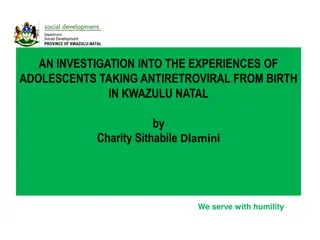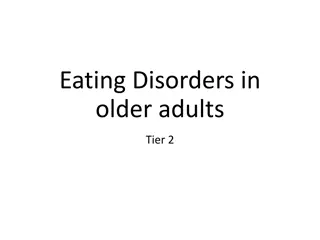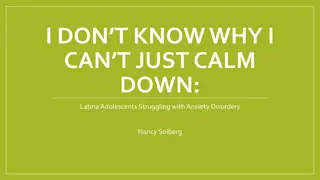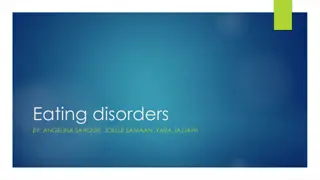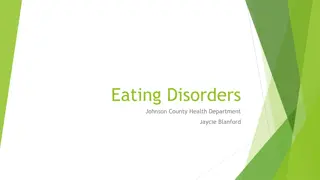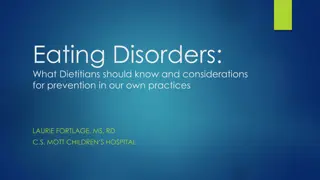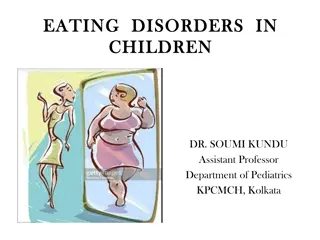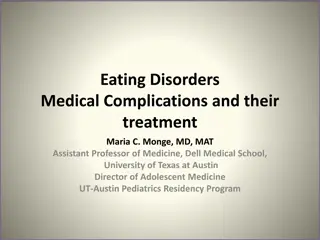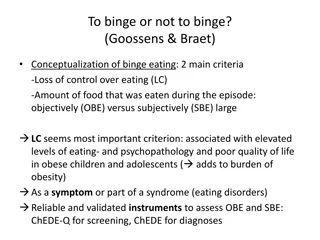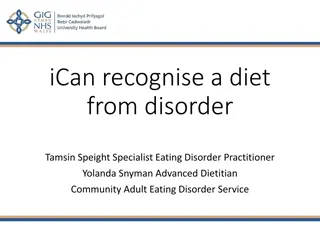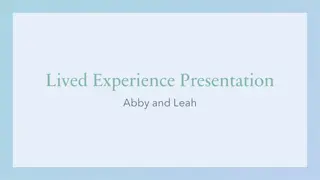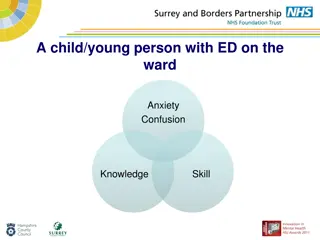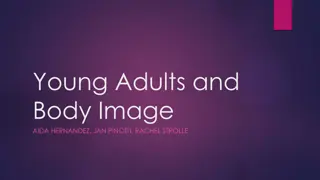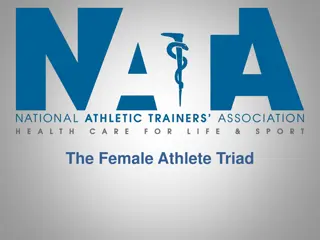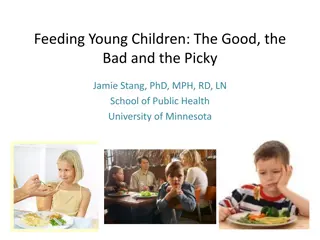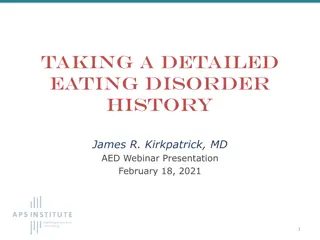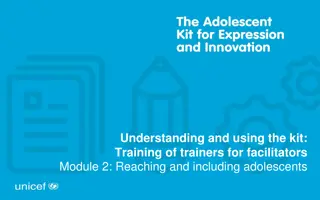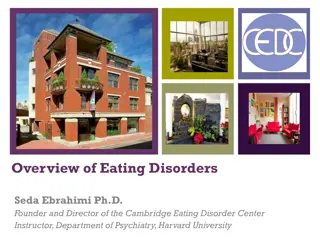Understanding Eating Disorders in Children and Adolescents: Insights from Dr. Irene Yi
This comprehensive presentation by Dr. Irene Yi delves into eating disorders, including Anorexia Nervosa and Bulimia, in children and adolescents. The content covers types of eating disorders, developmental perspectives, assessment stages, and management strategies. NICE guidelines for managing eating disorders are outlined, emphasizing psychological and physical risk assessments. Detailed insights into Anorexia Nervosa, its manifestations, physical and emotional aspects, are also provided.
Download Presentation

Please find below an Image/Link to download the presentation.
The content on the website is provided AS IS for your information and personal use only. It may not be sold, licensed, or shared on other websites without obtaining consent from the author. Download presentation by click this link. If you encounter any issues during the download, it is possible that the publisher has removed the file from their server.
E N D
Presentation Transcript
Eating Disorders Oct 2014 Dr Irene Yi Specialist EDS for Children and Adolescents
Types of Eating Disorders Anorexia Bulimia EDNOS Selective Eating Food avoidance emotional disorder Restrictive Eating
Developmental Perspective Lack of reserve in children and young people Rapid rate of weight loss Medical compromises Pulse rate / blood pressure / dehydration Re-feeding syndrome Growth
Overview Manifestations Assessment Stages of Change Management psychological medical
NICE Guidelines The majority should be managed on an OP basis by a service with expertise in both the psychological aspects and in assessing the physical risk associated with ED Assessment and treatment should be provided at the earliest opportunity When IP tr is required this should be provided in a unit with specific skills in treating ED For BN as a first step encourage pts to follow an evidence-based self- help programme BN pts may be treated with CBT adapted as needed to suit age and specific circumstances and include the family as appropriate
Anorexia Nervosa Characterized by: Self starvation Excessive weight loss Intense fear of fatness Unrelenting pursuit of thinness
Anorexia Nervosa Excessive weight loss (15%) Severe diets odd food behaviours and rituals Hyperactivity Investment in perfectionism Denial of hunger Preoccupation with food, weight and/or body image thoughts
Emotional Manifestation of AN Inability to express or cope with emotional situations Increasingly diminished social and inter-personal functioning isolation Feelings of inadequacy, low or no self-esteem Extreme moodiness Intense remorse and shame regarding eating behaviours and their body
Physical Manifestations of AN Inability to express or cope with emotional situations Increasingly diminished social and inter-personal functioning isolation Feelings of inadequacy, low or no self-esteem Extreme moodiness Intense remorse and shame regarding eating behaviours and their body
Bulimia Nervosa Characterized by: A secretive cycle of binge eating and self induced purging Rapid consumption of large amounts of food A sense of loss of control Compensatory purging to get rid of food or calories consumed
Behavioural Manifestations of BN Secretive and impulsive behaviours Purging Large weight variations Food hoarding, stealing Often associated behaviours Preoccupation with food, weight and body image thoughts Aware of hunger, but eating behaviour not connected to hunger cues
Emotional Manifestations of BN Frequent sense of shame and guilt connected to behaviours Intense fear of fatness Suicide thoughts and attempts Frequent mood swings Low self esteem, ongoing feelings of unworthiness
Physical Manifestations of BN Digestive problems Electrolyte imbalance Hypokalemia Russell s sign Dehydration Dental problems Muscle Spasms Cardiac arrhythmias Fatigue Menstrual irregularities Swollen parotid glands Loss of enamel Receding gums Esophageal tears Anemia
Early Manifestations The SCOFF Questions S sick C control O one stone F fat F food A score of >2 indicates a likely case of AN or BN
Assessment Physical Medical compromise Psychiatric Psychopathology Depression Obsession/compulsion Motivation Family Questionnaires / EDE
Stages of Change Precontemplation Contemplation Preparation Action Maintenance Termination
Management Psychoeducation Medical Meal planning Weight Monitoring Psychological Individual / group (MET / CBT / IPT / CRT) Family Individual / multifamily
Medical Management Criteria for admission to Paediatric Ward Weight 4 Height <67 70% (BMI <13) Cardiac abnormalities Sys <80, Dias <60, P <40) Electrolyte abnormalities (K <3, Na <130, Mg <0.5, PO4 < 0.5, Urea > 10) Severe hypothermia (<36) Hypoglycaemia (< 2.5)
Estimated Energy Requirement Age Energy (F) Energy (M) 15-18 2110 kcal/day 2755 kcal/day 11-14 1845 kcal/day 2220 kcal/day 7-10 1740 kcal/day 1970 kcal/day
What Works Working with parents Collaboration Consistency Compassion Containing Anxiety Dispelling Myths Engagement Empowerment Psycho-education Support
What works Dispelling Myths Engagement Empowerment Psycho-education Support Research Evidence Family based treatments Current Interest in Neuropsychology
Competence Fraser (Gillick) Competence Capacity to consent
Helping People with Anorexia Assume mixed feelings (not antagonism) Fear of changing and fear of staying the same Few people want to be anorexic Provide ladders not cranes Traps Battling Colluding Scare tactics Most adolescents get better
My Friend In a way you have made my life much easier. Instead of having lots of thoughts and worries I just concentrate on you. You determine whether I am happy or sad and you make everything less complicated. You ve made me much happier about the way I look and you make most of my decisions for me. I wish people would understand how you feel and what you re thinking.
My Enemy I wish you wouldn t hurt my friends and family, they don t deserve this. I don t want you to prevent me from doing things I enjoy. You are deceitful in that you don t show me what I really look like. I know this because I m starting to believe some of the things people tell me. It hurts most when I see people I love suffer because of you.



